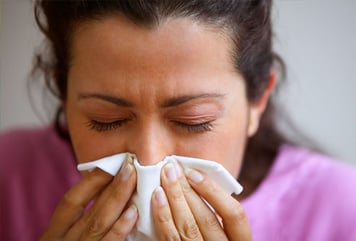 It’s winter in Cincinnati. And despite some abnormally warm temperatures thus far, it’s nonetheless cold and flu season.
It’s winter in Cincinnati. And despite some abnormally warm temperatures thus far, it’s nonetheless cold and flu season.
That cold weather in and of itself causes colds and flu is, of course, an old wives’ tale. It’s true that exposure to colder temperatures causes the body to expend more energy keeping the vital organs warm and functioning, thereby making less energy available for immune system regulation and response.
But most Americans have the advantage of living in well-heated, insulated residences. So, if not because of the colder outdoor temperatures, why are colds and flu more prevalent in the winter?
It all has to do with air circulation
In the winter, what do we do? We stay indoors, right?
Indoors, the air circulates around less than outside. Airborne germs like influenza, rhinoviruses and coronaviruses are trapped and constantly recirculated. The more people frequent a given indoor area, the more likely viruses and bacteria will make their way into that indoor environment and be passed around.
But there are ways for a senior living in Cincinnati to fortify his or her body’s defenses and become less susceptible to common winter illnesses. Today, we’ll look at four sound strategies for staving off avoidable illnesses this season.
1. Wash your hands
Flu and cold viruses are passed through the air in aerosolized droplets of body fluid, or via surfaces contaminated by droplets of infected body fluid.
Imagine an inoculated (germ-exposed) person sneezing, coughing, or wiping his or her watery eyes, then touching a doorknob — those germs are now present on the doorknob and will be picked up by the next hand to touch it.
The germs are thereafter introduced into the new host when the person with contaminated hands eats, drinks, wipes a mucous membrane like an eye or nose, or when hands are microscopically cut or crack in dry winter air.
How does frequent handwashing protect you?
Hand soap doesn’t typically kill those viruses. But soap and water remove viruses from skin surfaces by detergent and mechanical action — the same way your washer lifts stains from a shirt.
The more often you wash your hands, and the more vigorously you do so, the more likely you’ll reduce your overall exposure by reducing the number of viruses present on your hands.
Never eat or drink without first washing your hands. And try not to wipe your nose, mouth, or eyes without first washing your hands, and washing your hands again afterward.
2. Get your annual flu vaccine
It’s very important to get your flu vaccination every year. Although the vaccine isn’t a guaranteed preventative, it greatly reduces your chances of developing the flu in a given year.
There’s also strong evidence that, over time, repeated annual vaccinations give your body broader and better immunity to a variety of flu strains. Every time you get the yearly flu vaccine, you reduce the chances you’ll catch a flu years down the road.
3. Get your yearly pneumonia vaccines
Pneumonia is one of the leading causes of death in the elderly. Seniors are, in general, less active and more sedentary than younger people. Their lungs are generally weaker and have less capacity.
And seniors are (again, generally) less able to fight off colds, flu, and other primary respiratory diseases that can lead to the secondary bacterial lung infections that cause pneumonia. Getting the flu vaccine every year will also reduce your chances of developing pneumonia. So too will the vaccine against pneumococcal bacteria — one of the most common pneumonia vectors.
Like the flu vaccine, the pneumonia vaccine must be administered yearly to be effective. Medicare B covers the pneumonia vaccine at 100 percent, so long as vaccines are received 12 months apart.
4. Eat right, rest well, stay active
One bit of conventional wisdom about cold and flu prevention is no old wives’ tale. Getting plenty of rest, eating nutritious food and staying active will absolutely fortify your immune system and make you better able to fight off infections.
“Eat the rainbow,” as they say. Purple cabbage, orange carrots, green leafy vegetables, red apples and berries, yellow bananas, blueberries, pink grapefruit — the more varied the colors of the fresh produce you eat, the broader the vitamin and mineral intake you’ll enjoy and the healthier you’ll be.
Make sure you’re getting seven to nine hours of rest per night. If you have trouble sleeping through the night, see your doctor and what strategies you could use to get better, more restful sleep.
And during the day, move about! Take walks, exercise in your living room, get out and see friends and family. Join a gym or pool. The more exercise you get, the healthier you’ll be overall.
Use these tips to stay healthy throughout cold and flu season.
Share them with your family and your senior friends. Stay safe this winter. Stay healthy!












